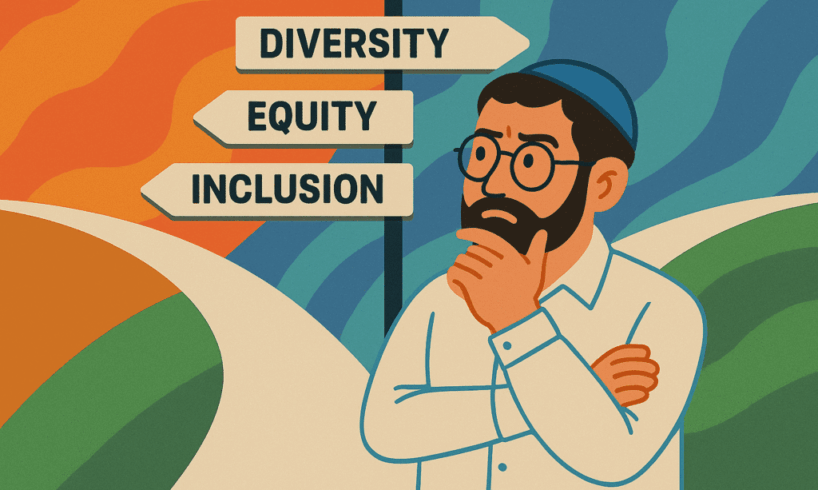
Diversity, Equity, and Inclusion, or DEI, has become one of the most influential and controversial frameworks in American life, and has come to influence everything from hiring practices and university policies to the very language used to discuss identity. At its core, DEI aims to address systemic disparities by amplifying the voices of historically marginalized communities and promoting more equitable outcomes. Each word carries a noble ideal: diversity celebrates difference, equity seeks fairness, and inclusion strives to ensure everyone belongs.
But for Jews, the framework itself poses a challenge: we don’t fit neatly into its categories.
Jews have long been racialized—from Nazi Germany to modern identity politics—despite being a complex mix of religion, ethnicity, culture, and peoplehood. That complexity defies DEI’s rigid categories. When fairness is measured by outcomes rather than opportunities, Jewish achievement is often reframed as proof of unearned privilege. And because DEI frameworks tend to equate “privilege” with “whiteness,” Jews are almost automatically placed in that box. Within the binary of oppressor and oppressed, Jews are slotted as “white” or “white-adjacent,” a distortion that erases Jewish diversity, centuries of persecution, and the persistence of antisemitism today.
In this sense, Jews are not simply overlooked by DEI; we are a direct challenge to its logic. This tension leaves the Jewish communities with two paths: push for DEI to expand and explicitly include antisemitism, or recognize that its underlying structure may be incompatible with Jewish identity and seek to rethink it altogether.
On the surface, DEI sounds like it should protect Jews as a religious and ethnic minority. It claims to safeguard against bias, which, in theory, should include training that addresses antisemitic stereotypes, building workplaces and campuses that keep kosher food and respect Shabbat observance, and developing reporting systems that treat antisemitism as seriously as other forms of hate. In reality, however, antisemitism is often left out of DEI curricula altogether, and Jewish concerns are treated as secondary or dismissed outright.
DEI claims to foster solidarity among marginalized groups, but in practice, Jews are often left out of the very alliances they helped build. Our historic role in movements for civil rights, immigrant protections, and interfaith advocacy is rarely acknowledged, and instead of standing shoulder to shoulder with other communities, Jews are increasingly excluded, and at times even protested against, by those same coalitions.
Our history of persecution — from pogroms to the Holocaust to synagogue shootings — is brushed aside as irrelevant. Our present-day vulnerability, including the surge of antisemitism after October 7, is minimized or denied. And our achievements, built through resilience, learning, and communal support, are reframed as evidence of “privilege,” as if Jewish success were unearned or came at the expense of others. In DEI spaces, what should have been solidarity becomes rejection, and the community that once prided itself on building bridges finds itself shut out of the very coalitions it helped create.
Intersectionality, which was meant to broaden inclusion, ends up narrowing it for Jews. DEI’s handling of intersectionality compounds this exclusion. In theory, the concept should align perfectly with Jewish experience. Jews are Ashkenazi, Sephardi, Mizrahi; both a religion and a people. Jewish identity embodies precisely the kind of layered complexity DEI claims to celebrate. Yet instead of acknowledging that richness, DEI frameworks often erase our diversity rather than recognizing it.
Nowhere is this erasure more visible than in conversations about Israel. DEI should, by its own logic, protect against discrimination based on national origin, which ought to include Jewish ties to Israel. Instead, Zionism is recast as colonialism, and Jewish attachment to Israel is reframed as complicity in oppression. Anti-Zionism is normalized, while antisemitism is too often excused as “resistance.”
These exclusions are not accidental; they stem from DEI’s underlying logic: fairness measured by outcome, rather than opportunity. Within this framework, Jewish achievement in universities, medicine, or business is viewed with suspicion. “Overrepresentation” is taken as proof of unearned advantage rather than resilience or hard work. The same charge is leveled against Asian Americans, whose academic and professional success has been pathologized instead of celebrated — a dynamic underscored by the Supreme Court’s recent ruling striking down race-based college admissions, which found that Asian applicants were systematically disadvantaged. What should be admired as persistence becomes recast as privilege.
Universities provide some of the clearest examples of how DEI fails Jews. At Stanford, two Jewish counselors in Counseling & Psychological Services filed complaints with the Equal Employment Opportunity Commission alleging that the university’s DEI framework created a hostile environment. They reported being told that Jews were “privileged,” pushed into “white affinity groups,” and dismissed when raising concerns about antisemitism. A similar dynamic unfolded at the University of Southern California in 2023, when the Jewish valedictorian was targeted with antisemitic harassment. Instead of defending her, the administration canceled her commencement speech, citing “safety concerns.” What should have been a program for inclusion instead erased their identity and excluded them from the very protections DEI claims to guarantee.
This gap between promise and reality forces a question: how should Jews respond? In practice, DEI reflects an ideology that judges people by group identity rather than individual character. It reduces individuals to the groups they’re assigned to, stripping away context, achievement, and personal history. For Jews, this flattening is especially damaging, turning a multifaceted identity into a political abstraction rather than something to be understood on its own terms. Because Jewish identity doesn’t fit neatly into DEI’s categories, the framework doesn’t know where to place Jews, thus treating them less as a community to engage with than as a problem to explain away.
Faced with this reality, Jews are left with a difficult choice, which has divided the community.
The first camp believes DEI can be reformed. The reformist argument is pragmatic: DEI is entrenched in institutions, exists everywhere, and if we don’t engage with it, Jews risk being erased completely. These voices argue that abandoning DEI would leave Jews even more vulnerable in institutions where it is already the dominant framework. Their solution is to push DEI to explicitly include antisemitism, treating it as seriously as racism, sexism, or Islamophobia. Reformers point to efforts to add antisemitism to Title VI protections, to develop DEI training that acknowledges Jewish identity, and to highlight the racial and cultural diversity within Jewish life. For Jews of color, in particular, the language of intersectionality can serve as a useful tool.
Pamela Nadell, historian and director of Jewish Studies at American University, cautions that efforts to dismantle DEI — even when framed as combating antisemitism — could ironically isolate Jewish students and employees further. She warns that she is “deeply worried that … the antisemitism task force’s demands to dismantle DEI as the root of antisemitism will further isolate Jews in American colleges and universities.” Adding that “Jews will be blamed for its abolition. But antisemitism will not disappear from the campus.”
David Bernstein, author of “Woke Antisemitism,” shares this stance. While he is skeptical that DEI can ever fully function as intended, he warns against walking away entirely: “I would like to think DEI could be reformed … but diversity should mean bringing together people from different backgrounds and experiences … and it must include viewpoint diversity. Without it, the environment becomes illiberal, giving rise to antisemitism and other bigotries.”
Others argue that the problem runs deeper — that DEI itself is built on flawed assumptions. Critics see its oppressor–oppressed binary as inherently flawed, one that will always cast Jews as privileged and Zionism as colonialism. For them, no amount of reform can overcome the ideology at DEI’s core. Instead, they call for replacing it with new frameworks rooted in universal civil rights, equal treatment, and constructive disagreement. Here, they often contrast today’s DEI model with the older vision of fairness that guided civil rights movements in the past: judging people by character and merit. That earlier vision measured individuals by their contributions and integrity. DEI, by contrast, collapses people into categories and prejudges them accordingly.
Some of the harshest critiques of DEI have come from public figures who see its very structure as dangerous for Jews. Bill Ackman, a billionaire investor and Harvard alumnus, has been outspoken in arguing that DEI is “the root cause of antisemitism at Harvard.” He points to DEI’s binary worldview, which places Jews on the “privileged” side and erases both Jewish vulnerability and connection to Israel. Ackman’s critique reflects a growing view that DEI is not merely incomplete but structurally hostile to Jews.
Bari Weiss, the journalist and founder of The Free Press, has made a similar critique: that DEI does not exclude Jews by accident but creates “an intellectual framework in which Jews are recast as oppressors and Israel is cast as evil.” In her call to end DEI entirely, she argues it has become “an ideological movement bent on recategorizing every American not as an individual, but as an avatar of an identity group, his or her behavior prejudged accordingly…” Weiss asserts that instead of expanding opportunity, DEI’s framework narrows it by stripping away merit, context, and history, reframing achievement as unearned privilege.
The debate over DEI and Jews ultimately comes down to one enduring question: should Jews fight to reform a system that has so often excluded them, or walk away from it altogether? Time and again, Jews have been asked to navigate frameworks that do not know where to put us — or whether to include us at all. Whichever path we choose, one truth remains non-negotiable: Jews cannot be erased.
The challenge is to decide how best to protect that truth — by pressing DEI to honor its own principles, or by building new models of fairness rooted in universal rights, character, and shared responsibility. The task, as it has always been, is to insist on our complexity, our history, and our right to belong.





